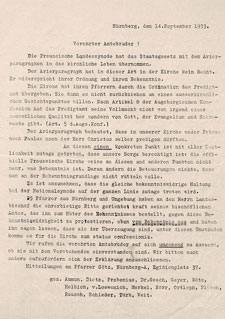Nuremberg Pastors: Against the Aryan Paragraph
The Nazi state enacted the Law for the Restoration of the Professional Civil Service on April 7, 1933, which called for the dismissal or early retirement of civil servants of “non-Aryan ancestry”. The German Christians vociferously demanded an equivalent provision for pastors and church officials, too. In the fall of 1933, this Nazi legislation was adopted in several of regional churches controlled by the German Christians and the “Aryan paragraph” was introduced for church employees.
Most notably, this happened in the Evangelical Church of the Old Prussian Union, which accounted for nearly half of German Protestantism. The Old Prussian General Synod – the so-called “Brown Synod” – resolved to adopt the “Aryan paragraph” as church law on September 5, 1933.
This resolution had a ripple effect. As a result, the chairman of the Bavarian National Socialist League of Protestant Pastors, Friedrich Klein (1894-1946), a pastor in Grafengehaig, forwarded a motion at the regional synod to adopt the state’s “Aryan paragraph” in the Evangelical Lutheran Church in Bavaria, too.
Twenty-five pastors from Nuremberg and its environs joined together to prevent the adoption of the “Aryan paragraph” and asked regional bishop Hans Meiser (1881-1956) in a letter of September 14, 1933 to protest against this violation of the confession by virtue of his episcopal office, which made him guardian of the confession. They additionally established that the “Aryan paragraph” has no right in the church in this form since it is inconsistent with its order and its confession. Its introduction would mean that neither Peter nor Paul nor the Lord Christ himself would be allowed to preach in our church.
In a letter written that same day, they informed one hundred ninety pastors about their request to the regional bishop and called upon them to endorse their statement. One hundred forty-five pastors endorsed the statement, fifteen others did so with qualifications and ten rejected it.
Through clever negotiations with the German Christian members of the regional synod, Regional Bishop Meiser succeed in preventing the motion for adoption of the “Aryan paragraph” in the regional church from even being addressed at the synod’s special session from September 12 to 14, 1933. The Aryan paragraph was never introduced in the Evangelical Lutheran Church in Bavaria later, either.
Nevertheless, this did not mean that pastors and church leaders denied the Nazi state’s right in the governmental sphere to dismiss “non-Aryans” from the civil service or to disenfranchise and ostracize them by other measures. On the contrary, the majority conceded this right to the state in its own sphere.
A few individuals considered adopting the “Aryan paragraph” in the ecclesiastical sphere as well out of tactical reasons or demanded that Christians of Jewish descent be barred from ecclesiastical offices. The most notable were the theology professors Werner Elert (1885-1954) and Paul Althaus (1888-1966) in their “Erlangen Opinion” of September 25, 1933. Since the Bavarian regional church was able to preserve its integrity until the end of the Nazi regime, pressing need for debate on the “Aryan paragraph” never arose.
Source / title
- © Landeskirchliches Archiv Nürnberg, Personen LXIII, Nr. 1, Kern

